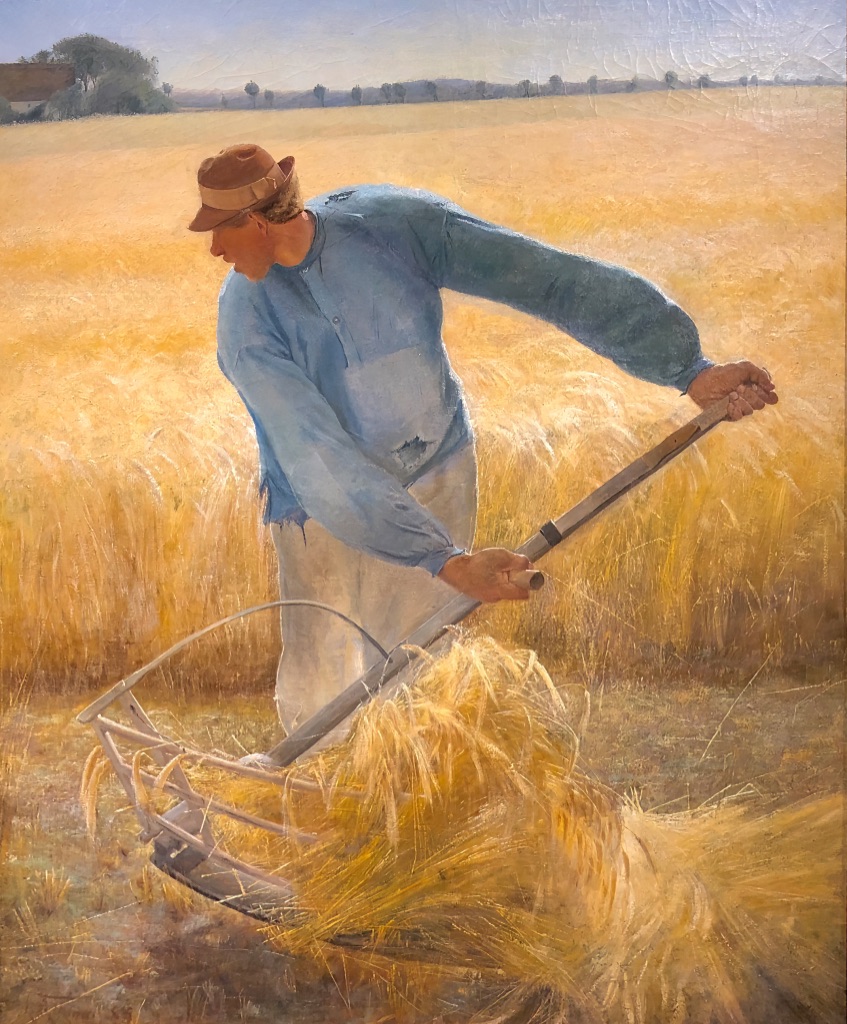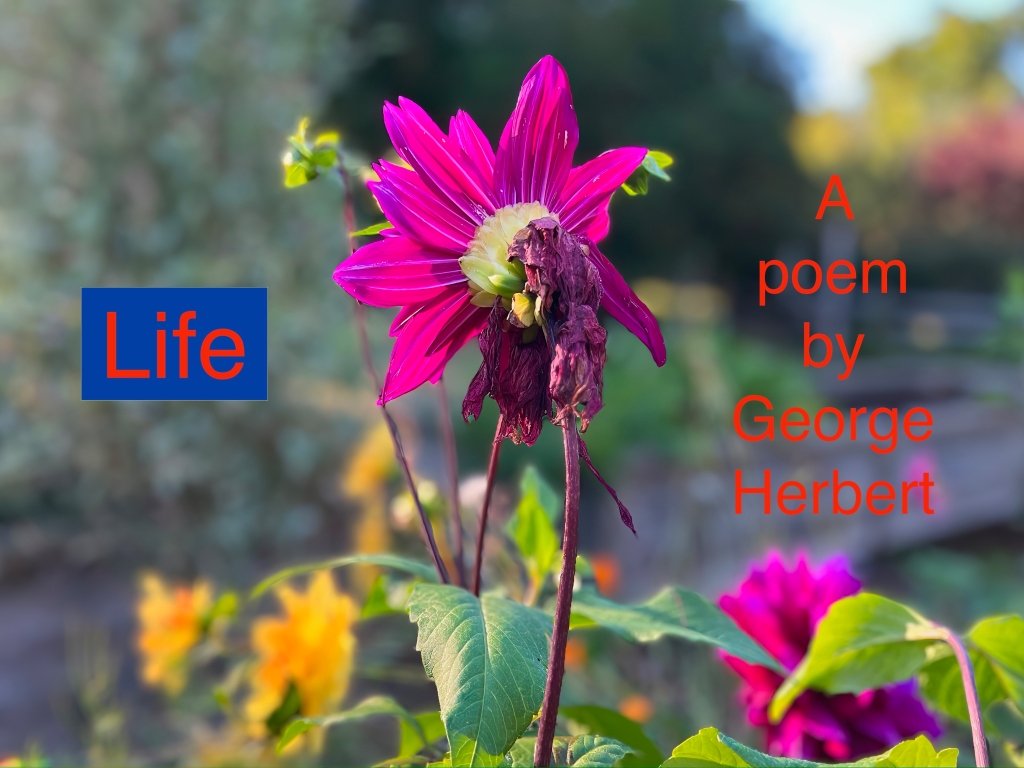
This is the fifth time in ten years of blogging that I have observed the feast day of poet-priest George Herbert—”the greatest devotional poet in the English language”[i]—with a reflection on his poetic “heart work and heaven work.”[ii] For me, in our spiritually impoverished secular age, he remains an indispensable guide for a life of prayer. As I wrote in a previous post,
“Herbert’s passionate engagement with the Transcendent––among us, within us, over-against us––was not theoretical or abstract, but intimate and experiential, employing the first-person form of lyric poetry to open a clearing where his inmost feelings could show themselves to both the speaker and his readers. In his striking play of words, images and sounds, a consort of meanings both public and private, we overhear Herbert’s prayers, and witness the argument of his soul. The brilliance of his poetic invention is never for its own sake. He seeks not to show off his skill, but to surrender his will.”
You can find more general information about Herbert’s life and works in the links at the end of this post. Today I want to look at two poems about the inescapable mortality of the human condition. In the first, “Time,” the poet meets up with the Grim Reaper, wielding his scythe used to harvest the ripe field of human souls. He is, of course, the personification of the temporal flow that sweeps us all toward death. Instead of cowering in fear, the poet initiates a playful bantering, as if Time were his equal. Courteously, Time calls the poet “Sir,” and lets him do most of the talking.
Meeting with Time, slack thing, said I,
Thy sithe is dull; whet it for shame.
No marvell Sir, he did replie,
If it at length deserve some blame:
But where one man would have me grinde it,
Twentie for one too sharp do finde it.
Perhaps some such of old did passe,
Who above all things lov’d this life:
To whom thy sithe a hatchet was,
Which now is but a pruning knife.
Christs coming hath made man thy debter,
Since by thy cutting he grows better.
And in his blessing thou art blest:
For where thou onely wert before
An executioner at best;
Thou art a gard’ner now, and more,
An usher to convey our souls
Beyond the utmost starres and poles.
And this is that makes life so long,
While it detains us from our God.
Ev’n pleasures here increase the wrong,
And length of dayes lengthen the rod.
Who wants the place, where God doth dwell,
Partakes already half of hell.
Of what strange length must that needs be,
Which ev’n eternitie excludes!
Thus farre Time heard me patiently:
Then chafing said, This man deludes:
What do I here before his doore?
He doth not crave lesse time, but more.
From the first moment, the poet disses Time—none other than Mr. Death—calling him “slack” (meaning lazy and slow), and mocking his scythe as shamefully dull. Herbert’s health was poor when this was written (he would die at 40), and his jibe may have been the black humor of a dying man: With such a failing body, how come I’m still here? You need to sharpen your blade, Mr. Death!
But the poet’s surprisingly light tone here is a form not of denial, but of faith. For the believer, Time’s fatal blade brings not annihilation, but new growth: “By thy cutting he grows better.” We’re not sure what Time makes of this argument, but when the poet begins a more speculative discourse about time and eternity, wondering whether they intersect or remain totally separate, Time loses his patience. Why is he standing here listening to this mortal prattle on, wasting Time’s time?
What do I here before his doore? / He doth not crave lesse time, but more. Mr. Death thinks the poet is stalling, trying to gain a little more time with his philosophical filibuster. But knowing the poet’s faith, we may assume that Time is mistaken. What the poet craves is not more time, but eternity: freedom from temporality itself, in “the place where God doth dwell” beyond the binaries of here and there, then and now, presence and absence.
When the 20th-century poet and critic Paul Zweig was diagnosed with lymphoma in his forties, he wrote about his oncologist’s assurances that he might still have a “long time” left.
“Listening to my doctor was delicate. I took in every shrug, every rise and fall of his voice. I weighed his words on a fine scale, to detect hope or despair. Then I called up another doctor, to hear how the words sounded in his voice. I triangulated and compared all to find something that would shut off the terror for a while.” [iii]
Zweig’s “terror” feels searingly authentic. Can we say the same about Herbert’s tranquility? And what happens next, when Time finally loses its patience with us? Herbert does not say. Cannot say, in fact. No one can. Does the silence after the final line signify emptiness (nothing at all), or absolute wholeness (God all in all)? Your answer will shape your religious practice.

Our second poem, “Life,” surprises us when we discover it’s really about death. But isn’t that how life is?—surprising us by coming to an end. Whether it be bitter or sweet, our continued existence seems so convincing. Until it’s not.
The poem’s imagery is very simple. A small bundle of cut flowers, already starting to wither by midday, becomes, through the poet’s act of sustained attention, a metaphor for his own mortality. The materiality of the flowers—which the reader is enabled by the text to see, smell, and touch—is a striking example of Herbert’s “sacramental poetics.” The 16th-century Reformation debates about real Presence haunted the religious poetry of the 17th century. What is the relationship between matter and spirit? Can bread and wine be God, and still remain their material selves? Or as Herbert put it, “how shall I know / Whether in these gifts thou bee so …” [iv]
The inseparability of sign and signified, visible and invisible, matter and spirit was foundational for Herbert. The sacramental bread and wine are capable of “Leaping the wall that parts / Our souls and fleshly hearts.”[v] (The HC 1633) But the sacred elements never vanish into abstractions, mere ideas. They remain material objects we can taste and see with our own material bodies. As Kimberly Johnson explains in Made Flesh: Sacrament and Poetics in Post-Reformation England:
“Just as in the Incarnation the Word was made flesh, such that material and spiritual ontologies might be maintained simultaneously, Herbert’s poetics endorses a representational system wherein the material is not supplanted by spiritual significance but persists as a site of sensory participation … Poetry, as Herbert recognizes, is an embodied art. It activates the flesh as a perceptual instrument and preserves in its nonreferential features the incarnational properties of language, and it is because of these qualities that poetry serves, for Herbert, a sacramental function.” [vi]
In “Life,” the words that engage our senses are not disposable means for grasping abstractions; the flowers remain outward and visible objects in the world (heard, seen, smelled, felt) which are at the same time inseparable from the inward and spiritual meanings they signify. As you read the next poem, notice how the text takes hold of your senses.
I Made a posie, while the day ran by:
Here will I smell my remnant out, and tie
My life within this band.
But Time did becken to the flowers, and they
By noon most cunningly did steal away,
And wither'd in my hand.
My hand was next to them, and then my heart:
I took, without more thinking, in good part
Times gentle admonition:
Who did so sweetly deaths sad taste convey,
Making my minde to smell my fatall day;
Yet sugring the suspicion.
Farewell deare flowers, sweetly your time ye spent,
Fit, while ye liv'd, for smell or ornament,
And after death for cures.
I follow straight without complaints or grief,
Since if my sent be good, I care not if
It be as short as yours.
Following the structural pattern of the 17th-century “poetry of meditation,” whose sensuous imagery was strongly influenced by the Ignatian “application of the senses” to biblical visualizations, “Life” begins by declaring its topic. The speaker has made a “posie” (meaning both a posy of flowers and the “poesy” of Herbert’s verse, adroitly binding those flowers to the written text which offers them to our senses). Next comes a statement of the meditation’s purpose: by comparing his life to the flowers, the poet will “smell my remnant out.” Using the verb’s secondary meaning—to discern as if by smell (think of “sniff out”)—the poet proposes to reflect on the remainder of his life. The rest of the poem moves through a series of sensations and feelings to reach its conclusion of acceptance and resolution in the face of death.[vii]
Before the first stanza ends, the flowers have already withered, though the day is but half done. In the second stanza, the poet absorbs the flowers’ fate with his senses, his feelings, and his thought. He can’t help but “smell” his “fatall day.” This time, however, the sense of smell seems less metaphorical: even the reader cannot miss the whiff of decay.
And yet, Time’s admonition is “gentle.” The flowers are not mowed down by a sharpened scythe, but softly “beckened” to “steal away.” The idea of death is so “sweetly” conveyed by this natural process that it feels sugar-coated and easy to swallow. And like the flowers which have spent their allotted time pouring out their sweet fragrance, the poet resolves to follow their example “without complaints or grief.” As long as his “sent” (scent) is fragrant with goodness, then whatever the actual date on which he is sent to God, all is well. How long we live doesn’t matter nearly so much as how well we live.
In our own violent and dispirited age, we may wonder over the lack of anguish, or fear, or rage, or grief in these poems. Where is “the terror?” How gently—and confidently—do Herbert’s speakers go into death’s good night. Many will find such tranquil surrender to be false, naïve, archaic, unrealistic, incomprehensible, or simply impossible. Nevertheless, Herbert’s poetry remains to pose the vital question: Are we still capable of imagining “Such a Way, as gives us breath … Such a Life, as killeth death?” [viii]
Previous posts about George Herbert:
Heart Work and Heaven Work (2015)
“Flie with angels, fall with dust”— Appreciating George Herbert (2019)
Tune My Heart to Sing Thy Grace — George Herbert’s “Denial” (2020)
“Though the whole world turn to coal” — George Herbert’s “Virtue” (2023)
[i] Helen Wilcox, The English Poems of George Herbert (Cambridge, UK/NY: Cambridge University Press, 2007), xxi. This extensively footnoted collection is indispensable for navigating Herbert’s 17th-century idioms and discovering the wide variety of interpretive strategies applied to his deeply-layered texts over the years.
[ii] This term was applied to Herbert by his contemporary Richard Baxter, a Puritan divine. Herbert’s feast day is February 27.
[iii] Paul Zweig, Departures (New York: Penguin Books, 1988), q. in Death (Lapham’s Quarterly, Vol. VI, No. 4, Fall 2013, p. 210). Zweig wrote this c. 1981, and died in 1984.
[iv] George Herbert, “The H. Communion” (W).
[v] Ibid., “The H. Communion” (1633).
[vi] Kimberly Johnson, Made Flesh: Sacrament and Poetics in Post-Reformation England (Philadelphia, PA: University of Pennsylvania Press, 2014), 60-61.
[vii] Louis L. Martz, The Poetry of Meditation (New Haven, CT: Yale University Press, 1962), 58-59. This classic study covers the poets who applied the spiritual exercises of the Counter-Reformation to their poetry and compositional practice: John Donne, George Herbert, Henry Vaughan, Richard Crashaw, Richard Baxter, and Robert Southwell.
[viii] George Herbert, “The Call.” This beautiful poem, set to a memorable tune by Ralph Vaughan Williams, is #487 in the Episcopal Hymnal 1982.






